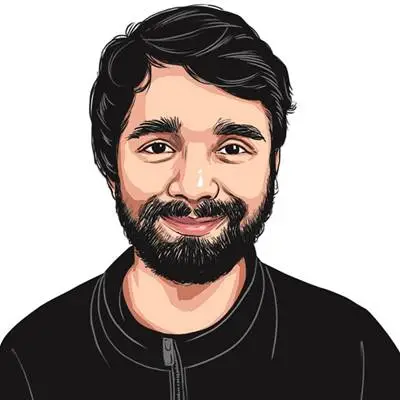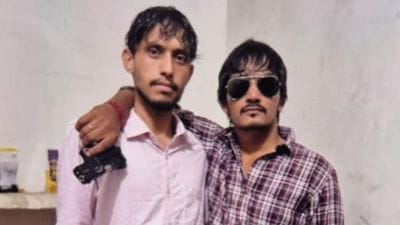Asad Rehman is with the national bureau of The Indian Express and covers politics and policy focusing on religious minorities in India. A journalist for over eight years, Rehman moved to this role after covering Uttar Pradesh for five years for The Indian Express. During his time in Uttar Pradesh, he covered politics, crime, health, and human rights among other issues. He did extensive ground reports and covered the protests against the new citizenship law during which many were killed in the state. During the Covid pandemic, he did extensive ground reporting on the migration of workers from the metropolitan cities to villages in Uttar Pradesh. He has also covered some landmark litigations, including the Babri Masjid-Ram temple case and the ongoing Gyanvapi-Kashi Vishwanath temple dispute. Prior to that, he worked on The Indian Express national desk for three years where he was a copy editor. Rehman studied at La Martiniere, Lucknow and then went on to do a bachelor's degree in History from Ramjas College, Delhi University. He also has a Masters degree from the AJK Mass Communication Research Centre, Jamia Millia Islamia. ... Read More
Rajbhar seeks to push SBSP beyond east UP comfort zone
SP ally, Suheldev Bharatiya Samaj Party has sprung a surprise by fielding two candidates in central UP for the upcoming Assembly polls
 Om Prakash Rajbhar (file photo)
Om Prakash Rajbhar (file photo)Om Prakash Rajbhar-led Suheldev Bharatiya Samaj Party (SBSP) seems to be expanding its footprint in the poll-bound Uttar Pradesh. A former BJP ally, the SBSP, which is now part of the Samajwadi Party(SP)-led alliance for the upcoming Assembly elections, has recently announced two candidates in central UP.
In the 2017 UP polls, when the BJP-led coalition had swept UP winning a total of 325 seats in the 403-member state Assembly, the SBSP, which had then fought the polls in alliance with the saffron party, had won four seats after contesting from eight constituencies — all in eastern UP, its known stronghold.
The SBSP, however, now appears to be gearing up to expand its influence to central UP. SBSP chief Rajbhar, who had sought to take credit for the BJP’s victory in 2017, says he will repeat the feat with the SP this time.
In 2017, Rajbhar had become an MLA for the first time after winning from the Zahoorabad seat in Ghazipur. He was appointed minister for backward classes welfare. Barely two years later, Rajbhar got disgruntled with the BJP and withdrew from the alliance after resigning from the Yogi Adityanath Cabinet in the run up to the 2019 Lok Sabha elections.
While the SBSP has enjoyed the support of the Rajbhar community, an OBC sub-caste whose share in UP’s population is 3-4 per cent, the party is now also claiming that it has brought together a slew of other smaller and most backward OBC sub-castes such as Shakyas, Sainis, Mauryas, Kushwahas, Arkvanshis, Raghuvanshis, Pals, Chauhans, among others, on a platform.
Among the SBSP’s key demands is that a caste-based census should be done to ensure a fair share of backward communities in reservation — something that SP president Akhilesh Yadav has pledged to do if his party-led coalition, including non-Yadav OBC parties, is elected to power in the state.
So far, the SBSP has announced its candidates from three seats, including one in eastern UP’s Balha (Bahraich) and, to the surprise of many, two in central UP — in Sandila (Hardoi) and Misrikh (Sitapur).
The SBSP’s UP unit president Sunil Arskvanshi has been fielded from the Sandila seat, while the party has given ticket to first-time candidate Manoj Kumar Rajvanshi in Misrikh. From the SC-reserved Balha constituency, the party has nominated Lalita Harendra. All these three seats are currently held by the BJP.
The SBSP’s move has left several SP leaders wondering why the alliance has given two seats in central UP to the former whose comfort zone is known to be confined to eastern UP with sizeable Rajbhar population. SBSP national spokesperson Piyush Mishra explains this is being done because his party has made an assessment of the central UP region and wants to tap into the “anger” against the Adityanath government among the OBC and MBC (most backward classes). “Our party chief Om Prakash Rajbhar has given a share in SBSP to people who were not being heard by any party. Take, for instance, Sunil Arkvanshi, who has been fielded from Sandila. He was made the state chief some time back, and we are confident of winning the seat by a big margin,” he says. “In fact, after seeing our party fielding a candidate from the Arkvanshi community, the BJP has also fielded a candidate from the same community after dropping its sitting MLA there.”
He was referring to Sandila’s sitting BJP MLA Raj Kumar Agrawal who had won the seat in 2017 after garnering 90,362 votes against the then SP candidate Abdul Mannan’s 69,959 votes. The BJP has now replaced Agrawal with a first-time candidate Alka Arkvanshi.
In Sandila, as per estimates, there are around 50,000 Arkvanshi voters, 15,000 Yadav voters, 60,000 SC voters, while the Muslim community forms the majority with about 65,000 votes. With the BSP fielding Abdul Mannan this time, the SP seems to be wary of a split in Muslim votes, which might be the reason why it preferred to give the seat to the SBSP. “The SP-SBSP is hopeful of getting Arkvanshi votes, support from some Muslims and all of Yadavs in Sandila,” said an SP leader.
In the SC-reserved Misrikh seat in Sitapur district, the BJP has chosen to field its sitting MLA Ram Krishna Bhargava. In the 2017 polls, Bhargava had got 86,403 votes against the then BSP candidate Manish Kumar Rawat’s 65,731 votes. The then SP candidate Ram Pal Rajvanshi had finished third with 61231 votes.
The SBSP has fielded Manoj Kumar Rajvanshi from Misrikh this time, who is the son of former minister in the SP government, Ram Pal Rajvanshi. Misrikh has estimated 80,000 SC voters, while each of the Muslim, Yadav, Thakur and Arak (OBC) community accounts for about 20,000 voters. There are nearly 30,000 Brahmin voters in the constituency, which has about 40,000 voters from other backward communities too.
A senior SP leader said the SBSP has got a few seats from the alliance in central UP because of “winnability” of its candidates, adding that “they have worked on these seats, and hence the SP has given them the seats”.
SBSP spokesperson Mishra says, “The slogan ‘Om Prakash Rajbhar ji ki ek kamai, aapne soyi hui kaum jagai’ (only earning of Om Prakash Rajbhar has been that he has woken up a sleeping community) is appropriate as we are hopeful of sending at least 14-15 MLAs to the Vidhan Sabha. We are hopeful of getting a total of around 20-25 seats in the alliance. The OBC and MBC communities will vote for us in huge numbers.”
Photos





- 01
- 02
- 03
- 04
- 05



























